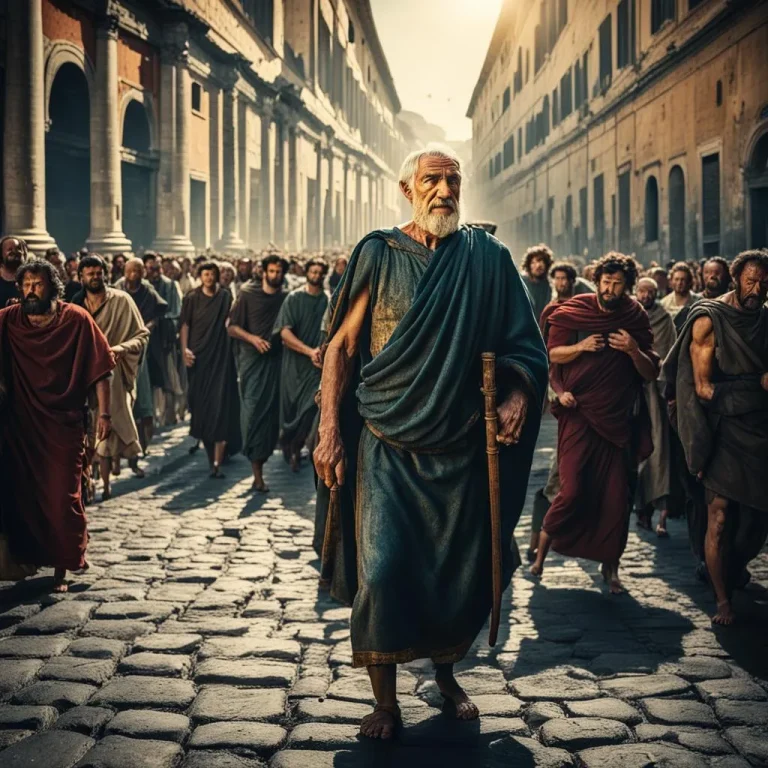
Philosophy and religion are distinct disciplines, yet they often intersect and share common themes leading many thinkers to wonder where philosophy ends and religion begins, in other words what are the fundamental differences between philosophy and religion when both give you rules to live a good life and one also promises a reward in the afterlife?
It’s actually quite simple! Philosophical inquiry typically involves critical thinking, logical reasoning, and the systematic analysis of the fundamental questions about existence, the nature of knowledge, how to behave ethically towards one another, and the true nature of reality. It seeks to understand through reason and argumentation.
In contrast however, religious inquiry revolves around matters of faith, belief, and revelation. In other words, we believe something because we have it on very good authority, that God said so! Religion explores questions about the divine, spiritual truths, morality, and the afterlife. Religious beliefs are often based on sacred texts, tradition, and personal experiences of the divine.
When it comes to philosophy there are no sacred texts. Immanual Kant was a German philosopher who lived from 1724 to 1804. He is widely regarded as one of the most influential figures in modern philosophy. Kant spent the majority of his life in the city of Königsberg, Prussia (now Kaliningrad, Russia), where he worked as a professor at the University of Königsberg (today known as the Immanuel Kant Baltic Federal University).
Kant is most famous for his Categorical Imperatives. These are attempts to define through the use of sound reasoning universally binding commands or edicts that are always right regardless of personal desires or circumstances. Kant argued that these imperatives are based on reason alone and are applicable to all rational beings. While opinions may vary on the exact formulation of categorical imperatives, some key principles that are often considered to be irrefutable include:
The Formula of Universal Law:
This imperative states, “Act only according to that maxim whereby you can at the same time will that it should become a universal law.”
In other words, one should act in a way that they would want everyone else to act in similar circumstances. This principle emphasises the importance of consistency and universality in moral actions.
Then we have:
The Formula of Humanity:
Kant also proposed that we should “act in such a way that you treat humanity, whether in your own person or in the person of any other, never merely as a means to an end, but always at the same time as an end.”
This highlights the intrinsic value of every human being and encourages respect for individual autonomy and dignity.
Kant attempted to make lots of other categorical imperatives, but most were shot down in flames by other philosophers only too happy to tear apart his reasoning and highlight any flaws in his ideas that would prevent from being universally true. If Philosophy behaved like religion (and it has once or twice in history) then Kant’s rubbish ideas would never have been challenged and we’d all be poorer for it. In other words, bad ideas are tested and discarded, good ideas prevail over time which is why Kant’s Formula for Humanity is still very much admired and generally considered to be irrefutable.
Religion and philosophy often overlap, but the most succinct explanation is that Religion is considered to be the correct preparation for the afterlife, whilst philosophy is an attempt at living well now, in this life, the one that you are experiencing right now.
The Basis of Authority:
It’s like this we know that we are born, and all things that are born must die, we don’t know if life continues after death, some people say that it does, others disagree, but we do know that we’re alive now and that it makes sense to maximise our life chances by using our rational faculty, which may or may not be a divine gift but nevertheless separates us from the animals. Human beings are the rational animals of planet Earth which is why Philosophical arguments rely on reason, evidence, and logical coherence. Philosophers often appeal to principles of logic, empirical observation, and rational argumentation to support their claims.
In contrast religious beliefs are typically grounded in authority figures, sacred texts, religious leaders, or divine revelation. Followers of a religion may accept certain doctrines or teachings based on faith rather than empirical evidence. In other words, Moses or some other prophet from ancient times said that something or other was true and correct practice in the eyes of God so it makes sense that we follow the example of Moses, Jesus, Mohammed or whomever the authority figure happens to be which brings us nicely on to the subject of the:
Approach to Truth
Philosophers seek to uncover universal truths through reasoned inquiry and critical analysis. The emphasis is on rational justification and logical consistency. In contrast religious truth as previously mentioned often involves elements of faith and belief in the supernatural. Truth claims in religion may be based on divine revelation, sacred texts, or the teachings of religious authorities.
Then we have:
The Scope of Inquiry
Philosophical inquiry encompasses a wide range of topics, including metaphysics (the nature of reality), epistemology (the nature of knowledge), ethics (which are moral principles), aesthetics (which is the nature of beauty), and logic (the principles of reasoning).
When it comes to religion however, inquiry focuses primarily on questions related to the divine, to spiritual matters, to derived morality from the teachings of earlier figures important within the scope of that religion. Then of course there’s the correct way to observe rituals which may be a necessary part of the process of attaining eternal life. These rules, hard coded into the very fabric of the religion are sacrosanct and cannot usually be changed. It’s very rare for a religion to move with the times, the ones that do so are either in the process of failing with attendance dropping or have already failed (the empty church syndrome).
The we have:
Methodology:
Philosophical inquiry employs various methodologies, including thought experiments, logical analysis, conceptual analysis, and dialectical reasoning. Philosophers often engage in reasoned debate and dialogue to explore different perspectives on philosophical issues this strongly contrasts with the type of religious observance of rituals, prayers, meditation, and other spiritual practices aimed at cultivating a deeper connection with the divine. Interestingly religious traditions may also incorporate storytelling, myth, and symbolism to convey spiritual truths and moral lessons.
While philosophy and religion have distinct approaches and methodologies, they both play important roles in shaping human understanding and addressing existential questions about the nature of reality, knowledge, morality, and the meaning of life. It’s also worth noting that there can be fruitful dialogue and exchange between philosophy and religion, as each discipline offers unique insights into the human condition and the search for meaning. So, to conclude Religion is the correct preparation for the afterlife, should one exist, philosophy is an answer to the question of ‘how do we live a good life now?’

